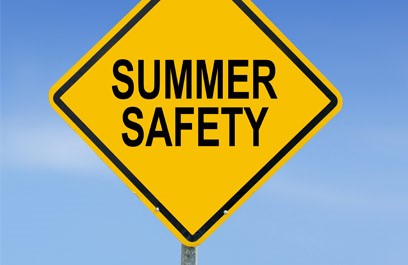With the summer temperatures expected to climb into the high 90s today and with the humidity pushing the heat index to 100 degrees or higher, the Wolf Administration is encouraging all Pennsylvanians to protect themselves and loved ones, including pets, from the heat.
“The heat and humidity over the next few days can be dangerous to people and animals, so it is important that we all know how to take care of ourselves and those we care about,” said Governor Tom Wolf. “Infants and children, older adults, and people suffering from illness are most at risk from the heat. Check on loved-ones and neighbors, limit outdoor activities and never leave young children or pets in vehicles as interiors can reach lethal temperatures within a minute.”
There are several groups of people who are at risk of developing heat-related health conditions during high temperatures. Those groups include infants and young children, people 65 years of age and older, people with chronic medical conditions and those who must work outdoors. It is important to make sure these groups are monitored on hot days.
At-risk individuals should consider going somewhere with air conditioning, such as a mall, library or other temperature-controlled locations. Pennsylvania’s network of Area Agencies on Aging is a great resource for seniors or their caregivers to find senior centers acting as cooling centers if needed. To contact your local Area Agency on Aging, click here.
Heat Tips
The following are tips to avoid heat-related illnesses:
- Drink plenty of water and do not wait until you are thirsty to drink more fluids;
- Avoid drinks with caffeine, alcohol, or large amounts of sugar, as they can cause dehydration (loss of body fluids);
- Stay indoors in air conditioning as much as possible – this is the best way to protect against heat-related illness and death;
- Avoid long periods in the direct sun or in unventilated rooms;
- If you must be outside in the heat, reschedule activities for cooler times of the day, and try to rest often in shady areas;
- Dress in light-colored, loose-fitting clothing, a wide-brimmed hat, and sunglasses – and use a sunscreen of SPF15 or higher;
- Take frequent baths or showers and remain in a cool place.
Warning Signs of Heat-related Illnesses
The most common heat-related illnesses are heat stroke and heat exhaustion. Warning signs of heat stroke include extreme body temperature, rapid pulse, throbbing headache, dizziness and confusion.
If you think someone is having a heat stroke, it is important to first call 9-1-1. After calling for help, get the person to a shady area and quickly cool them down by putting them in a tub of cool water or spraying them with a garden hose. You should not give the victim any fluids, including water, to drink.
Heat exhaustion symptoms include heavy sweating, paleness, muscle cramps, tiredness, weakness, dizziness, headache, nausea or vomiting, and fainting. If someone is suffering from heat exhaustion, help the person cool off and seek medical attention if symptoms are severe, symptoms last more than one hour, or the victim has heart problems or high blood pressure.
The Department of Health has more information about heat-related illnesses and how to stay safe.
Caring for Pets and Livestock
Pet owners should remember that outdoor pets should have access to shade and plenty of fresh, clean, cool water. Animals kept indoors should have proper ventilation. Dogs should be walked in the early morning or late evening to avoid the extreme heat and take advantage of the cooler periods of the day.
In 2018, Governor Tom Wolf signed the Motor Vehicle Extreme Heat Protection Act. This law protects law enforcement or other public safety officials who remove a pet believed to be in danger from an unattended hot car. The law does not protect citizens, so any person that sees a pet in a car and believes they’ve been neglected or are in danger should immediately call local authorities.
If you see any of the following heat exhaustion signs in your pet, seek immediate veterinary care:
- Anxiousness
- Excessive panting
- Restlessness
- Excessive drooling
- Abnormal tongue color
- Collapse
Livestock owners should take appropriate precautions to protect their animals from high temperatures that can cause them to suffer from heat-related stress and illness. Heavier, fattened livestock, those with dark coats, and chronic health conditions are at the greatest risk for stress from heat.
Signs of stress in livestock include:
- Animals bunching together
- Heavy panting
- Slobbering
- Lack of coordination
- Trembling




